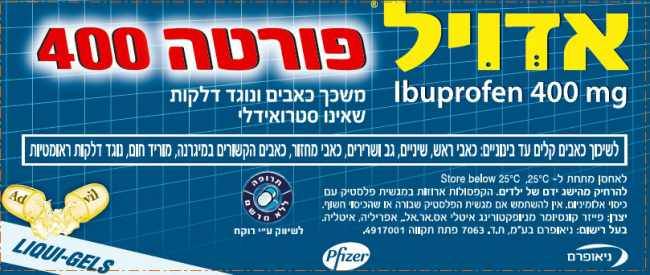Quest for the right Drug

אדויל פורטה 400 ADVIL FORTE 400 (IBUPROFEN)
תרופה במרשם
תרופה בסל
נרקוטיקה
ציטוטוקסיקה
צורת מתן:
פומי : PER OS
צורת מינון:
קפסולות ממולאות נוזל : CAPSULES LIQUID FILLED
עלון לרופא
מינוניםPosology התוויות
Indications תופעות לוואי
Adverse reactions התוויות נגד
Contraindications אינטראקציות
Interactions מינון יתר
Overdose הריון/הנקה
Pregnancy & Lactation אוכלוסיות מיוחדות
Special populations תכונות פרמקולוגיות
Pharmacological properties מידע רוקחי
Pharmaceutical particulars אזהרת שימוש
Special Warning עלון לרופא
Physicians Leaflet
Interactions : אינטראקציות
4.5. Interactions with other medicinal products and other forms of interaction Ibuprofen should be avoided in combination with: Aspirin: Concomitant administration of ibuprofen and aspirin is not generally recommended because of the potential of increased adverse effects. Experimental data suggest that ibuprofen may competitively inhibit the effect of low dose aspirin on platelet aggregation when they are dosed concomitantly. Although there are uncertainties regarding extrapolation of these data to the clinical situation, the possibility that regular, long-term use of ibuprofen, may reduce the cardioprotective effect of low-dose aspirin cannot be excluded. No clinically relevant effect is considered to be likely for occasional ibuprofen use (see section 5.1). Other NSAIDs: Ibuprofen should not be used with other pain relievers such as NSAIDs. Ibuprofen should be used with caution in combination with: Anticoagulants: NSAIDs may enhance the effects of anticoagulants such as warfarin (see section 4.4). When taking anticoagulants it should be taken into account that long-term use of ibuprofen may increase the risk of bleeding. Antihypertensives and diuretics: NSAIDs may diminish the effects of antihypertensives or thiazide diuretics. Diuretics can increase the risk of nephrotoxicity of NSAIDs. Corticosteroids: When taking corticosteroids and ibuprofen concomitantly there is an increased risk of gastrointestinal ulceration or bleeding. (see section 4.4). Anti-platelet agents and selective serotonin reuptake inhibitors (SSRIs): Increased risk of gastrointestinal bleeding (see section 4.4) Cardiac glycosides: Ibuprofen may increase serum digitalis concentrations. Serum digitalis concentrations should therefore be monitored in patients with decreased renal function or congestive heart failure. Lithium: Increases in serum lithium concentrations following administration of ibuprofen may be clinically significant. Methotrexate: Concomitant administration of ibuprofen with moderate and high doses of methotrexate may lead to serious and fatal methotrexate toxicity. Patients with reduced renal function may be at additional risk of toxicity from the combination even when low doses of methotrexate (≤ 20 mg/week) are used. Ciclosporin: Increased risk of nephrotoxicity. Tacrolimus: Possible increased risk of nephrotoxicity when NSAIDs are given with tacrolimus. Zidovudine: Increased risk of haematological toxicity when NSAIDs are given with zidovudine. There is evidence of an increased risk of haemarthroses and haematoma in HIV(+) haemophiliacs receiving concurrent treatment with zidovudine and ibuprofen. Quinolone antibiotics: Animal data indicate that NSAIDs can increase the risk of convulsions associated with quinolone antibiotics. Patients taking NSAIDs and quinolones may have an increased risk of developing convulsions. Phenytoin: Ibuprofen may increase pharmacologically active free phenytoin. Patients taking ibuprofen for long-term use should be monitored. Antacids: Certain antacids may increase the gastrointestinal absorption of ibuprofen. This is considered to be of clinical relevance particularly during long-term use of ibuprofen.

שימוש לפי פנקס קופ''ח כללית 1994
לא צוין
תאריך הכללה מקורי בסל
לא צוין
הגבלות
לא צוין
מידע נוסף
